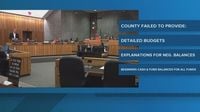On October 3, 2025, Tennessee Comptroller Jason Mumpower delivered a familiar blow to Shelby County’s leadership: for the fifth year in a row, the state’s most populous county failed to get its annual budget approved. The rejection, which centers on missing details and accounting inconsistencies, has ignited a new round of debate among local officials, state authorities, and the Memphis community—especially as the fallout could ripple across critical infrastructure projects, education, and public health services.
According to WREG, the rejection letter cited several persistent shortcomings. Among them, Shelby County failed to provide detailed budgets for all departments—most notably for Memphis-Shelby County Schools (MSCS). The letter also flagged missing explanations for negative balances and omitted starting cash and fund balances for all county funds. These omissions, the comptroller’s office argued, are not just technicalities; they’re fundamental lapses that prevent proper oversight of taxpayer dollars.
“There are 95 counties in Tennessee. Shelby County is the largest county by population in the state, and it’s the only county where this is the issue,” John Dunn, Director of Communications at the Tennessee Comptroller’s Office, told WMC. His surprise was palpable, given that the state’s budget submission requirements are, in his words, “very clear and forthcoming.”
The consequences of this fifth consecutive rejection aren’t just bureaucratic headaches. Under Tennessee law, Shelby County is now barred from issuing new debt or taking out loans for approximately eight months unless it receives explicit state approval. This restriction could put the brakes on a range of planned projects, from road and bridge upgrades to hospital renovations at facilities like Regional One. As FOX13 Memphis reported, any new expenses will have to be funded directly from county reserves—a tall order for any local government, let alone one with a population topping 900,000.
The state’s stance has only hardened with each passing year. “Continued and repeated issues should not be a problem that any local government encounters when our Office is very clear and forthcoming with the budget submission requirements,” the comptroller’s office noted in a statement published by WREG. Dunn reinforced this, explaining that the comptroller’s office had already met with one of Shelby County’s chief budget officers back in April, providing detailed guidance on what was needed for approval. “We told them specifically what was needed to get their budget approved,” Dunn said. The implication: Shelby County’s troubles are self-inflicted, not the result of shifting goalposts.
Yet, county officials see the situation differently. Shelby County Mayor Lee Harris, while acknowledging the rejection, struck an optimistic tone. “No project will be delayed as a result of this letter, and no borrowing plans are in any jeopardy,” Harris told FOX13 Memphis on October 3. He further assured residents and stakeholders that the county had no immediate plans to borrow funds anyway, suggesting that the state’s restriction is more of a nuisance than a crisis. Harris announced plans to meet with the comptroller the following week, expressing confidence that the concerns could be addressed and that budget approval was within reach.
Meanwhile, the county commission has not been idle. In February 2025, anticipating another possible rejection, commissioners passed a resolution outlining a set of guidelines for all future budgets. The hope was to break the cycle of disapproval by proactively addressing the state’s concerns. Still, the fiscal year 2026 budget failed to meet the mark, leaving some local leaders frustrated and searching for answers.
Education funding has emerged as a particularly thorny issue. The comptroller’s letter singled out the lack of detailed budgets for Memphis-Shelby County Schools, a point of contention between state and local officials. In response, MSCS stated they had “submitted all required budget documents to the commission ahead of schedule and were not notified that anything else was needed.” The disconnect highlights a broader communication breakdown that, if unresolved, could have real consequences for students and teachers across the county.
State Senators Raumesh Akbari and London Lamar have been vocal in their concern over the standoff’s potential impact. In a joint statement cited by WREG, they underscored the urgency of finding a solution to protect vital community investments: “From schools and roads to public safety and hospitals like Regional One, the people of Shelby County cannot afford delays or uncertainty.” The senators called on the state comptroller’s office to work collaboratively with county leaders, warning that continued gridlock could undermine public confidence and disrupt services that residents rely on every day.
Despite the heated rhetoric and finger-pointing, both sides claim a willingness to work toward a resolution. Dunn, speaking for the comptroller’s office, said they would be open to helping Shelby County craft a budget that meets all statutory requirements. “We just don’t know,” he said, when asked about the potential ramifications of the eight-month borrowing freeze. The uncertainty is clearly unsettling for everyone involved.
For many in Memphis and the surrounding area, the episode is more than a technical dispute—it’s a test of local government’s ability to manage complex finances and deliver on promises. The stakes are high: If infrastructure upgrades stall, if school funding is delayed, or if hospital improvements are put on ice, the consequences will be felt in neighborhoods from downtown Memphis to the far corners of Shelby County.
Yet, there remains a sense of cautious optimism. Mayor Harris, for one, is betting that face-to-face talks with the comptroller will yield a breakthrough. “We’re confident we can address the concerns raised in the comptroller’s letter,” he told WMC. For now, county leaders and state officials are locked in a delicate dance, each hoping to resolve the impasse without triggering a full-blown crisis.
As the days tick by and the eight-month clock begins, all eyes are on Memphis and Shelby County. Will this be the year the state’s largest county finally clears its budgetary hurdles? Or will it find itself back at square one, facing yet another round of rejections and restrictions? For now, the answer remains just out of reach—but one thing’s certain: the outcome will have lasting effects on the people who call Shelby County home.





